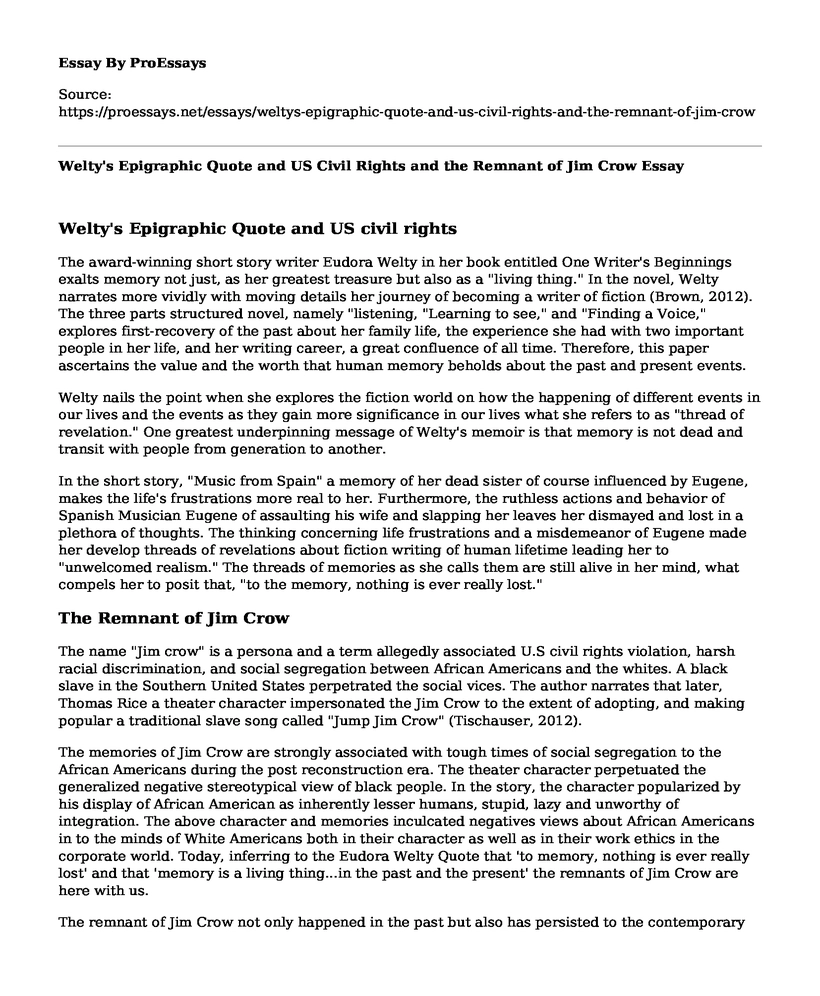Welty's Epigraphic Quote and US civil rights
The award-winning short story writer Eudora Welty in her book entitled One Writer's Beginnings exalts memory not just, as her greatest treasure but also as a "living thing." In the novel, Welty narrates more vividly with moving details her journey of becoming a writer of fiction (Brown, 2012). The three parts structured novel, namely "listening, "Learning to see," and "Finding a Voice," explores first-recovery of the past about her family life, the experience she had with two important people in her life, and her writing career, a great confluence of all time. Therefore, this paper ascertains the value and the worth that human memory beholds about the past and present events.
Welty nails the point when she explores the fiction world on how the happening of different events in our lives and the events as they gain more significance in our lives what she refers to as "thread of revelation." One greatest underpinning message of Welty's memoir is that memory is not dead and transit with people from generation to another.
In the short story, "Music from Spain" a memory of her dead sister of course influenced by Eugene, makes the life's frustrations more real to her. Furthermore, the ruthless actions and behavior of Spanish Musician Eugene of assaulting his wife and slapping her leaves her dismayed and lost in a plethora of thoughts. The thinking concerning life frustrations and a misdemeanor of Eugene made her develop threads of revelations about fiction writing of human lifetime leading her to "unwelcomed realism." The threads of memories as she calls them are still alive in her mind, what compels her to posit that, "to the memory, nothing is ever really lost."
The Remnant of Jim Crow
The name "Jim crow" is a persona and a term allegedly associated U.S civil rights violation, harsh racial discrimination, and social segregation between African Americans and the whites. A black slave in the Southern United States perpetrated the social vices. The author narrates that later, Thomas Rice a theater character impersonated the Jim Crow to the extent of adopting, and making popular a traditional slave song called "Jump Jim Crow" (Tischauser, 2012).
The memories of Jim Crow are strongly associated with tough times of social segregation to the African Americans during the post reconstruction era. The theater character perpetuated the generalized negative stereotypical view of black people. In the story, the character popularized by his display of African American as inherently lesser humans, stupid, lazy and unworthy of integration. The above character and memories inculcated negatives views about African Americans in to the minds of White Americans both in their character as well as in their work ethics in the corporate world. Today, inferring to the Eudora Welty Quote that 'to memory, nothing is ever really lost' and that 'memory is a living thing...in the past and the present' the remnants of Jim Crow are here with us.
The remnant of Jim Crow not only happened in the past but also has persisted to the contemporary modern society. For instance, until today, there is persistent residential segregation and growing social inequality reflecting the wealth gap between the whites and African Americans. Secondly, there are frequent hostile confrontations between African American youths and the police because of the high rates of unemployment and inadequate well resources schools (Daniel, 2013). Thirdly, the intense stereotypical view that exists in the corporate world hence many African Americas are jobless, and their civil rights violated. All these are traces of Jim Crow in post-reconstruction era.
Conclusion
In conclusion, Welty's memoir ascertains the significance of memory on how the happening of different events in our lives and the events as they gain more significance in our lives. Therefore, her memory is a living thing is greatly manifested in the rebirth of Jim Crow in our modern contemporary society.
References
Brown, C. J. (2012). A daring life: A biography of Eudora Welty. Jackson: University Press of Mississippi.
Daniel, P. (2013). Dispossession: Discrimination against African American farmers in the age of civil rights. Chapel Hill: The University of North Carolina Press
Tischauser, L. V. (2012). Jim Crow laws. Santa Barbara, Calif: Greenwood.
Cite this page
Welty's Epigraphic Quote and US Civil Rights and the Remnant of Jim Crow. (2022, Sep 20). Retrieved from https://proessays.net/essays/weltys-epigraphic-quote-and-us-civil-rights-and-the-remnant-of-jim-crow
If you are the original author of this essay and no longer wish to have it published on the ProEssays website, please click below to request its removal:
- History of US Law Enforcement Essay
- Sexual Harassment in Public Places: Experience of Canadian Women
- Equifax Company Case Study
- Research Paper on Real-Life Cybercrimes in the United Arab Emirates
- Unequal Treatment Within the Criminal Justice System by Race Essay Example
- Essay Example on UK Parliament Sovereignty: Ultimate Legal Authority
- Reforming Criminal Activity: Examining Correctional Systems & Victims - Essay Sample







